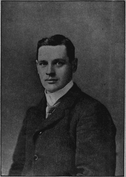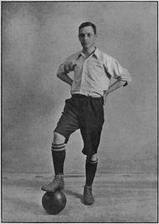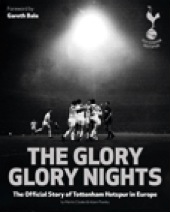 India Spurs have nominated John Cameron to be inducted into the Scottish Hall of Fame. This edition of Hotspur Towers contains a profile of John and is based upon the nomination letter with some extra Tottenham information and images. Once you have read this article please support the campaign, it only takes a few moments. Instructions at the end of the article. At first glance John Cameron might appear an unusual choice for nomination to the Scottish Hall of Fame. His career in Scotland was not outstanding, winning just one international cap, although that game did bring the British Home Championship to Scotland. Cameron was much more than just a talented player, suburb tactician and the author of one of the first training manuals. He was a successful manager and a champion of players rights. Oh and the first Scot to captain a World XI. John Cameron was born 13 April 1872 in Ayr. Described as a skillfully talented player who started his career at center forward but later converted to inside forward. He is remembered as much for his goal making as his actually scoring. After leaving the local grammar school he played for local teams before joining Ayr Parkhouse, (later to become part of Ayr United). He moved to the Queens Park club in 1895 (1). A strict amateur he was employed by the Cunard Shipping Line in their Glasgow offices and when he moved to their Liverpool base he joined Everton. He did however maintain his connections with Queens Park and thus is recorded as their player when he won his only international cap in a draw with Ireland in 1896. That result ensuring that Scotland won the Home Championship. The reports of the time indicate he gave a number of excellent performances for Everton. In total making 48 appearances and scoring 14 times. It was during this period he turned professional. This is thought to be due to the pressure he was put under by his fellow players at the club as they felt amateurs were not as committed as themselves. In February 1898, he was one of the founders and Secretary of the Association Footballers Union. Although fairly short lived, this body helped lay the foundations for the two PFA organizations on either side of the boarder. Cameron wrote the main objective of the Union was "they wanted any negotiations regarding transfers to be between the interested club and the player concerned, not between club and club with the player excluded.” He gave several interviews with ‘Football Chat,’ a leading journal of the period discussing the need for improved conditions for players. This Union and his involvement was in breech of the Football League’s directives. Everton transfer listed Cameron and in May of that year he joined Tottenham Hotspur. At that point they were still a Southern League team. The following February at the age of 26, he was appointed their player / manager. He then published both his book, “Association Football and How To Play It.” This text has certainly stood the test of time (2) as well as a history of his time at Tottenham (3). He returned home to Scotland before in early 1914. He became one of the first British coaches to work in Europe when he joined Dresdner SC in Germany. Where he became that clubs first paid coach. With the outbreak of World War One a few months later he was interned at Ruhleben detention camp. This was an old racecourse and the barracks were converted stables. Cameron was one of several international footballers at the camp and became one of the founders and secretary of the camps football association as well as a keen member of the tennis association. The camps footballing activities included league and cup competitions for 27 registered teams. Some games attracting crowds in excess of a 1000 prisoners. On 2nd May 1915 Cameron captained a World XI in a game against an England XI. The camp association also produced a handbook, programmes and an annual report.
In addition to these organized games Cameron cared for the wellbeing of his fellow prisoners and described in a letter in 1916 “Ragtime football, a loose kind of game for the elderly prisoners, kept many a man fit in spite of insufficient food.” Another letter he wrote during his imprisonment illustrates his state of mind and the conditions at that time. “The weather until the last few days has been simply vile, rain, rain with a cold wind. This is the worse place for the wind I’ve ever struck. It beats the east coast hollow. Yesterday it came in thunderingly hot. Today it is about ninety in the shade. So you can image what life is like in a loft. Our constant cry is “How long?” and we get utterly sick of each other at times. Must we be here for another football season? surely not.” Its interesting to note he still measured time by the football seasons. He was repatriated to Scotland in 1918 and returned to Ayr United where he managed for one season. Sadly the effects of his captivity had left him in ill health. After leaving Ayr he became a respected journalist before passing away in Glasgow on 20th April1935. His philosophy on football throughout his life was simple “winning is not all that matters, football is still foremost about entertainment.” I said John was more than a footballer. He was a magnificent ambassador for both his country and his sport. He was a great humanitarian and lived a life filled with passion for the game. One hundred years ago he was a prisoner of war and I believe this would be a fitting time to remember this amazing man, his life and achievements. Sir, I have the honour to place before you the name of John Cameron as a nominee for this countries Football Hall of Fame. Keith Harrison t- 16024542 f- peter shearman (old non de plume reserved for THFC matters) Please support this campaign, simply go to - http://scottishfootballhalloffame.co.uk/contact-us/ Notes - 1- It is not unusual for various records of this time to contradict each other, wherever possible I have confirmed all details contained with more than one source. My special thanks for assisting me in compiling of this nomination go to his family. I must also thank Duncan Carmichael, Club Historian at Ayr United. Georg Wehse of Dresdner, 1898 SC in Germany and John Fennelly at Tottenham Hotspur FC. Any errors are mine. As well as The National Archive, The football historians Bob Goodwin and Phil Sour. The British Museum, The Imperial War Museum, The Scotsman, Spartacus Educational and The Gutenberg Organization, 2- His book “Association Football and How To Play It’ can be accessed at http://www.gutenberg.org/files/35683/35683-h/35683-h.htm 3- The White Harts Souvenir of the Spurs entry to the English League.
3 Comments
keith
7/1/2015 01:06:36 am
watch out for regular updates in Talking Tottenham on fridays starting this week with which clubs have already offered to support us.
Reply
Suraj
14/1/2015 05:39:06 am
nice one Keith, great initiative, fully with you.
Reply
17/11/2017 03:43:53 pm
Keith, John Cameron did not die in Glasgow , but in Edinburgh. I am a present working on an article concerning his time, which he spent with 4 ex Everton players, in Rueleben. Will pass it on when complete. Good Luck with your project because, in my opinion , the guy has, in many respects, been overlooked.
Reply
Leave a Reply. |
Features
Flying Down to Rio History of T.H.F.C. Tribute to Bill Nicholson Talking Tottenham Early Legends The Road to Turin International Connections Hotspur Towers Most Read Articles
The 100 Year War Interview with Marina Sirtis A Long Dark Shadow By Royal Appointment School Report: An Insight into the Younger Eric Dier Dear Jimmy All Change At Spurs Hotspur Towers History Of THFC: Part 1 Passage to India: Rohan Rickets Thanks For The Memories Our Tommy Carroll The AVB Files: Part1 The Lilywhites You The Jury The Hand Of Hugo Connection - Argentina Creating a Reputation One Hotspur Archives
August 2018
Categories
All
|

 RSS Feed
RSS Feed

